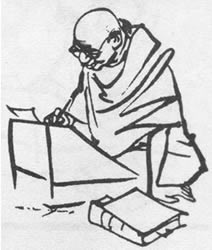
P.O. SEVAGRAM, DIST.WARDHA 442102, MS, INDIA. Phone: 91-7152-284753
FOUNDED BY MAHATMA GANDHI IN 1936
Selected Letters of Gandhi : Part-2
A collection of Mahatma Gandhi letters.

SELECTED LETTERS
Part-2
Table of Contents
- Faith In God
- Death
- Learn To Forget
- The Ashram Girl and Her Hair
- Degrading Exhibitions
- Growing Beard
- Means and Ends
- Satyagrahi in Prison
- Knowing God
- Who Is a Knight?
- Skill In Action
- The Gita Doctrine
- Fountain Pen, Asking Questions
- Prayer
- Judge Not
- Common Cold
- Education, Itch
- Sleep Under The Sky
- Perfect Food
- Fasting
- Real Prayer
- Four Laws
- Advice To A Patient
- Occult Sciences
- On Death
- Idol Worship
- Being Good
- Practicing Medicine
- Bad Dreams
- All Men Are Good
- Faith in Prayer
- Sorrow
- Untouchability
- Shed All Care
- Retirement, Honey
- Equimindedness
- Buddhism
- Publicity
- Brother Ass
- Varna And Caste
- Harijan Service
- Interpreting Scriptures
- Primus Stove
- Free Will, Village Work
- Good Wishes For The New Year
- Fitness For Fasting
- Silence
- Status of Scripture
- Birth and Death
- What A Boy Can Do?
- Khadi vs. Mill Cloth
- The Takli
- Gita Doctrine
- God Is
- Love Helps Lift Burden
- Fasting and Prayer
- Hinduism
- Key To Gandhiji’s Activity
- Bad Dreams
- Bangles For Girls
- Indebtedness
- Education
About This Book
Chosen & translated by :Valji Govindji Desai
First Edition : 1962
Printed and Published by :
Jitendra T. Desai
Navajivan Publishing House,
Ahemadabad-380014
India
©Navajivan Trust, 1927
Chapter-7: Means and Ends
Written to Shri Ramdas Gandhi during the convalescence at Juhu after the operation in the Sasson Hospital, Poona, in 1924
You ask me when I shall come so that we shall meet. If you made a proper use of your eyes, you would surely see me there, for my soul is there. It does not matter if my body is here or has even been reduced to ashes. It is quite possible that I may not be there in spirit although my body is there.
I wish you fully grasped one thing. We may be fit to attain the end or we may not be. This is always hidden from our eyes. But over the means we have full control; we are all fit for them and it is comparatively easy to achieve success in respect of them. Again we approach the end exactly to the extent that we make the means our own. Means we can recognize because seers have pointed them out, while they have declared the end to be difficult to understand. The chief means is Truth and I am sure you are good at it. You do not deceive any one, you do not like to deceive even yourself; therefore you are discontented and distress to find that you cannot at once become such as you would like to become. But to some extent we must be patient even with ourselves..... We should calmly begin to work at whatever we propose to do, try to achieve success in it and then cultivate indifference as regards the consequences.
There may be a tide and then an ebb in the ocean that is your mind; you must either be above these variations, or else be calm like the ocean in spite of its tides. Ideas of all kinds crowd into our minds, but he who maintains his equanimity in face of them is on the high road to success.
Do attend the player meeting even if your mind is inclined to wander. We offer prayers to concentrate our minds on the one thing needful. One who have achieve this concentration may or may not attend prayer meetings; it is all same to him. All that we can do is not deliberately to allow the mind to wander. Striving in this way we may hope one day to be conscious as the poet-saint Tulsidas was.
You apply impossible tests to others as to yourself and you find them wanting. There is no reason for despair if none of the Ashramites realize my ideal. If they were complacent as regards their condition, they would be guilty of hypocrisy, lacking even faith in the ideal. But surely you do not mean to say that people without such faith live in the Ashram only in order to deceive others. Even then let us always cling to hope. There is always hope in this world for those who strive.
Translated from Gujarati